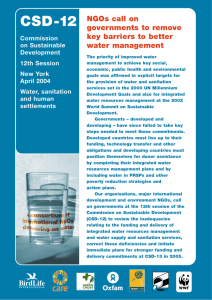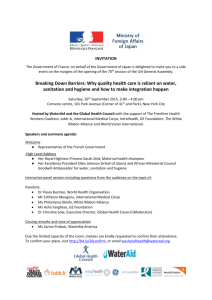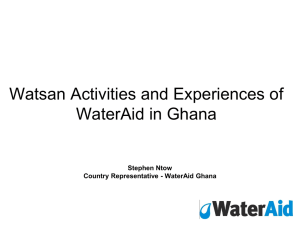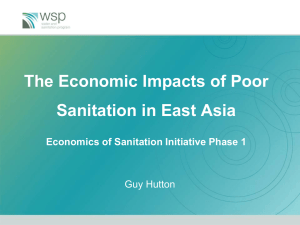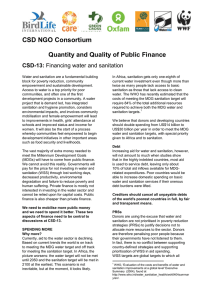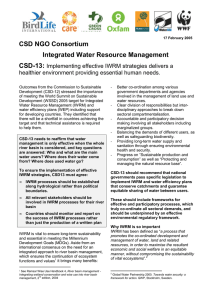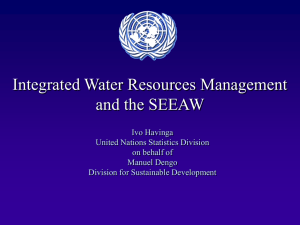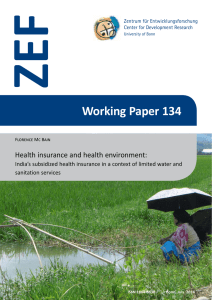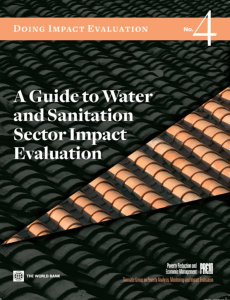CSD NGO Consortium Introducing the CSD-13 NGO Consortium CSD-13:
advertisement
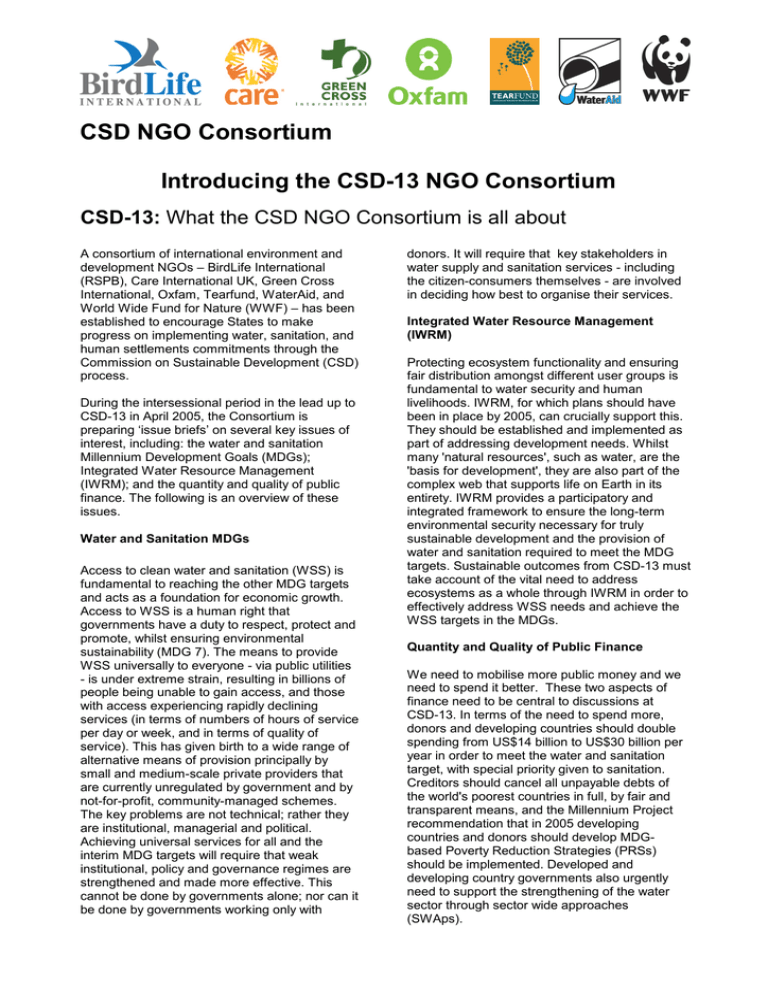
CSD NGO Consortium Introducing the CSD-13 NGO Consortium CSD-13: What the CSD NGO Consortium is all about A consortium of international environment and development NGOs –BirdLife International (RSPB), Care International UK, Green Cross International, Oxfam, Tearfund, WaterAid, and World Wide Fund for Nature (WWF) –has been established to encourage States to make progress on implementing water, sanitation, and human settlements commitments through the Commission on Sustainable Development (CSD) process. During the intersessional period in the lead up to CSD-13 in April 2005, the Consortium is pr epar i ng‘ i ssuebr i ef s’ onsev er al keyi ssuesof interest, including: the water and sanitation Millennium Development Goals (MDGs); Integrated Water Resource Management (IWRM); and the quantity and quality of public finance. The following is an overview of these issues. Water and Sanitation MDGs Access to clean water and sanitation (WSS) is fundamental to reaching the other MDG targets and acts as a foundation for economic growth. Access to WSS is a human right that governments have a duty to respect, protect and promote, whilst ensuring environmental sustainability (MDG 7). The means to provide WSS universally to everyone - via public utilities - is under extreme strain, resulting in billions of people being unable to gain access, and those with access experiencing rapidly declining services (in terms of numbers of hours of service per day or week, and in terms of quality of service). This has given birth to a wide range of alternative means of provision principally by small and medium-scale private providers that are currently unregulated by government and by not-for-profit, community-managed schemes. The key problems are not technical; rather they are institutional, managerial and political. Achieving universal services for all and the interim MDG targets will require that weak institutional, policy and governance regimes are strengthened and made more effective. This cannot be done by governments alone; nor can it be done by governments working only with donors. It will require that key stakeholders in water supply and sanitation services - including the citizen-consumers themselves - are involved in deciding how best to organise their services. Integrated Water Resource Management (IWRM) Protecting ecosystem functionality and ensuring fair distribution amongst different user groups is fundamental to water security and human livelihoods. IWRM, for which plans should have been in place by 2005, can crucially support this. They should be established and implemented as part of addressing development needs. Whilst many 'natural resources', such as water, are the 'basis for development', they are also part of the complex web that supports life on Earth in its entirety. IWRM provides a participatory and integrated framework to ensure the long-term environmental security necessary for truly sustainable development and the provision of water and sanitation required to meet the MDG targets. Sustainable outcomes from CSD-13 must take account of the vital need to address ecosystems as a whole through IWRM in order to effectively address WSS needs and achieve the WSS targets in the MDGs. Quantity and Quality of Public Finance We need to mobilise more public money and we need to spend it better. These two aspects of finance need to be central to discussions at CSD-13. In terms of the need to spend more, donors and developing countries should double spending from US$14 billion to US$30 billion per year in order to meet the water and sanitation target, with special priority given to sanitation. Creditors should cancel all unpayable debts of the world's poorest countries in full, by fair and transparent means, and the Millennium Project recommendation that in 2005 developing countries and donors should develop MDGbased Poverty Reduction Strategies (PRSs) should be implemented. Developed and developing country governments also urgently need to support the strengthening of the water sector through sector wide approaches (SWAps). For more information, please contact: Public money must be spent better. People need to be at the heart of water projects so that they are not passive beneficiaries but rather agents for change in their own development. Aid needs to be better targeted - donors should give 70% of water and sanitation official development assistance (ODA) to least developed and lowincome countries by 2008 –and water sector funds need to be made available quicker. Donors should recognize that wise water management based on the integration of human and ecosystem needs is the only way to achieve poverty alleviation, and that finance for IWRM plans in all countries must be provided. Successful community management approaches need better support for scaling up. Support needs to be given to local civil society organisations to advocate for the prioritisation of access to water and sanitation and delivery of integrated water resource management plans at national and regional decision-making fora and to inform and involve people in management decisions. The Need to Take Action TheConsor t i um’ si ssuebr i ef swi l l bedi st r i but ed throughout the intersessional period and at CSD13. Discussions among delegates and among stakeholders on the means of implementation needed to resolve the issues set out in the briefs are needed urgently. Delegates to CSD-13 need to work together, to discuss, and resolve these issues during the intersessional period and at the CSD-13 Preparatory meeting in February in order to make CSD-13andt heCommi ssi on’ s new programme of work a success. Jo Phillips BirdLife International (RSPB, UK Partner) Email: joanna.phillips@rspb.org.uk Websites: http://www.rspb.org.uk; and http://www.birdlife.net Jay Goulden Care International UK Email: goulden@ciuk.org Website: http://www.careinternational.org.uk Bertrand Charrier Green Cross International Email: bertrand.charrier@gci.ch Website: www.greencrossinternational.net Joanne Green Tearfund Email: joanne.green@tearfund.org Website: http://www.tearfund.org John Magrath Oxfam GB Email: jmagrath@oxfam.org.uk Website: http://www.oxfam.org Stephen Turner WaterAid Email: stephenturner@wateraid.org Website: http://www.wateraid.org Chris Williams WWF Living Waters Programme Email: chris.williams@wwfus.org Website: http://www.panda.org/about_wwf/what_we_do /freshwater/index.cf
